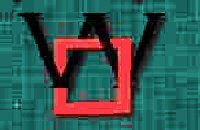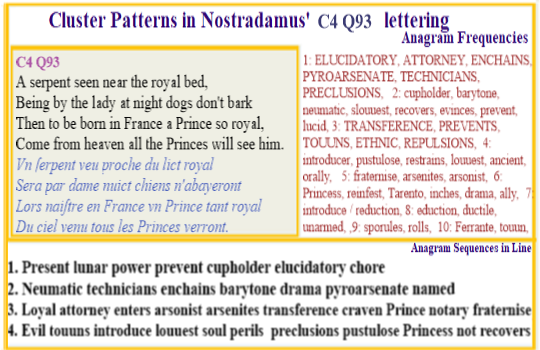 Analyses of all verses
Analyses of all verses
|
 Web Site
Web Site |
 All
Sefirots All
Sefirots |
Nostradamus C4 Q93: The loyal barytone whose act of arson affects royal line.
Copyright: Allan Webber, December 2015
 This verse carries powerful allusions to classical
astronomy figures thereby enabling a date to be given to a special royal
birth in 2013.
This verse carries powerful allusions to classical
astronomy figures thereby enabling a date to be given to a special royal
birth in 2013.
'A serpent seen near the royal bed' refers to the region of sky between King Perseus and his wife Andromeda where the serpent bearing head of Medusa is often depicted.
This head plays a critical role on their wedding night when Perseus uses it to turn his rival to stone by getting him to look into Medusa' face.
The location and the highlighting of the head in the sky indicates that the head of Taurus is Nostradamus' astronomic focal point.
Similarly 'The lady at night, the dogs will not bark' identifies the constellation as that of Virgo since this lady has the hounds of Bootes above her head. The anagrams give a complementary slant by revealing that it is the music of the verse that defines the planets involved and Nostradamus' guide in this matter seems to be the works of Cornelius Agrippa.
Agrippa makes music the major distinguishing feature in sorting the planets into two groups based on harmony or voice. He claims that of the seven Planets, Saturn, Mars, and the Moon have more of the Voice than of the Harmony which Jupiter, Sun, Venus and Mercury possess. In line with this this verse lacks internal rhyme which marks it as a verse of the voice.
And the evil tunes referred to in the anagrams are logically those of the voice making the Moon, Mars and Saturn the planets involved. The first line holds anagram clusters saying present Luna power ( al Vn - ſerpent - veu pro), elucidatory chore ( roche -e du lict roya). These form part of the key anagrams found in this verse and in the other lines there are other distinct attributes. We have barytones technicians ( ict chiens n'a- bayeront S), pyroarsenate drama ( ayeront Sera p - ar dam) and loyal arsonist ( oyal L - ors naiſt) which spell out in a quite specific manner things that identify a person's life.